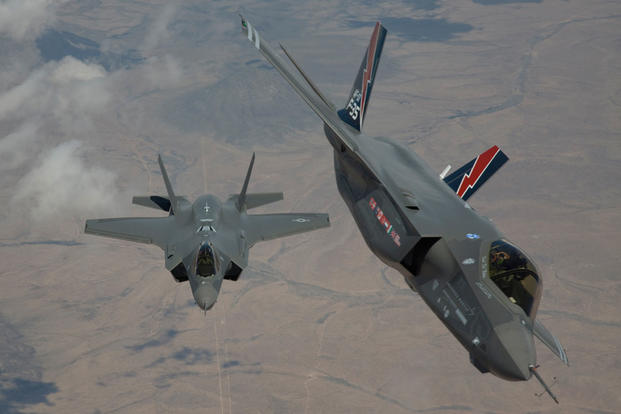Though Air Force officials touted the Joint Strike Fighter as ready for combat just weeks ago, it now says the F-35A Lightning II has suffered a major setback.
The service on Friday said it ordered a temporary stand-down of 13 out of 104 F-35s in the fleet, "due to the discovery of peeling and crumbling insulation in avionics cooling lines inside the fuel tanks," according to a statement from Air Force spokeswoman Ann Stefanek.
The issue, discovered during depot servicing, will affect a total of 57 aircraft, Stefanek said. The statement did not disclose when the problems were initially reported.
Of the 57 aircraft, 13 are in the fleet, two belong to foreign buyers, and 42 are still on the production line, according to a statement from manufacturer Lockheed Martin. Ten are at Hill Air Force Base, Utah; four are at Luke Air Force Base, Arizona, including the two non-U.S. Air Force aircraft; and one is at Nellis Air Force Base, Nevada.
Engineers with the Joint Program Office and Lockheed, along with Hill Air Force Base maintenance airmen, have conducted "inspections of eight aircraft and are currently developing procedures to resolve or mitigate the issue prior to release of affected production aircraft to the field and the return of affected operational aircraft to flight operations," Stefanek said.
The Air Force wants to mitigate the situation quickly to minimize negative impact on operations, training and readiness.
The stand-down may overshadow next week's Air, Space & Cyber Conference, organized by the Air Force Association, outside Washington, D.C., where officials such as Gen. Herbert "Hawk" Carlisle, Air Combat Command commander, and Lt. Gen. Christopher Bogdan, the F-35's program manager, are expected to speak on the stealth jet's initial operating capability.
On Aug. 2, Carlisle emphasized the need for the fifth-generation aircraft, the same day Lockheed and the Air Force simultaneously declared it ready for operations. The cost of the program has reached nearly $400 billion for more than 2,400 planes.
"Given the national security strategy, we need it," Carlisle told reporters during a briefing. "You look at the potential adversaries out there, or the potential environments where we have to operate this airplane, the attributes that the F-35 brings -- the ability to penetrate defensive airspace, the ability to deliver precision munitions with a sensor suite that fuses data from multiple information sources -- is something our nation needs."
However, lawmakers have concerns about the endless challenges the F-35 program has faced in the 15 years since Lockheed Martin was awarded the contract.
Sen. John McCain, the outspoken Republican chairman of the Senate Armed Services Committee, has repeatedly slammed the F-35's roller-coaster history.
"The F-35 program's record of performance has been both a scandal and a tragedy with respect to cost, schedule, and performance," the Arizona senator said at a Joint Strike Fighter program hearing in April. "And it's a textbook example of why this committee has placed such a high priority on reforming the broken defense acquisition system."
-- Oriana Pawlyk can be reached at oriana.pawlyk@military.com. Follow her on Twitter at @Oriana2014.
Related Video:
Bullet Points: F35 Lightning II
Don't Miss a Single Military.com Story
To read the full article and get exclusive benefits, sign up today.
It’s FREE
Why am I seeing this? Visit our FAQs



























